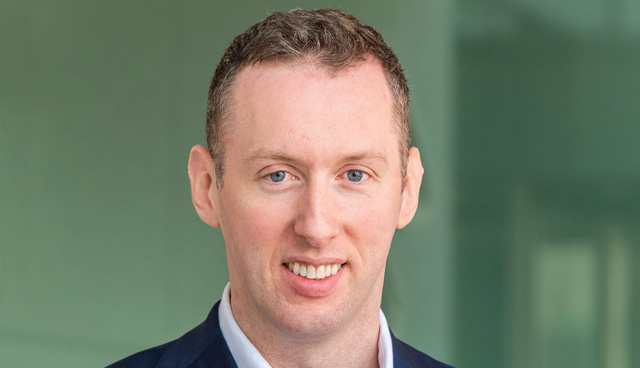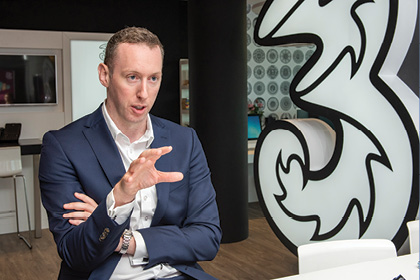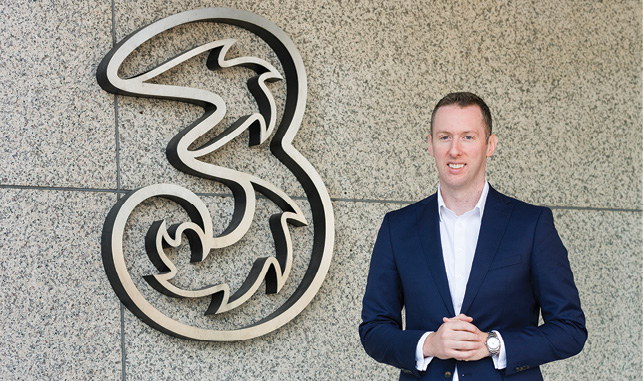The only limit is our imagination

Three Ireland’s newly appointed Head of Enterprise and Public Sector, Karl Duffy, meets with Ciarán Galway at the telecommunication provider’s docklands headquarters to talk mobile technologies and security challenges in the GDPR era.
After having spent almost a decade working within BT’s Global Services Division in London, Duffy has honed a keen sense of the wider portfolio that the most sophisticated enterprise and public sector customers require. Reflecting on the opportunity with Three, therefore, he identified an exciting degree of potential.
“Most people in the marketplace know us for mobile, but the calibre of our portfolio across products is very advanced and we currently have 42 per cent of the business market in Ireland. As a company we have invested €2 billion to date in our network, our systems and our products. Personally, what really excites me about Three is that we’re a challenger in the market. In mobile we’re number two and with that breeds a culture,” he explains.
Referring to his experience with BT, Duffy indicates that the day-to-day basis of his job was informed by a ‘what we have, we hold’ philosophy. With Three, however, he asserts: “We’re able to be more competitive in the market. That drives a more agile and more entrepreneurial culture in the organisation which is something that really attracted me.”
Transition
Four weeks into his role at Three, Duffy reflects on the O2 acquisition in 2014 and suggests: “What that did for Three, and for the B2B marketplace, was create a richer suite of products and portfolios that we can bring to the market. We acquired a scale which now allows us to be more competitive as number two in the market. At the same time, we have retained that original entrepreneurial spirit that Three had prior to the acquisition.”
Mobility
Mobility is a buzzword which, through the assertive positioning of the mobile device as a primary business tool, has been ‘real’ now for a number of years. “What we’re seeing now, on the back of this proliferation of mobile and mobility, is that employers are increasingly aware of what this can bring to the table,” outlines Duffy.
“For instance, with the extreme weather phenomena earlier this year, people couldn’t get to their workplaces, but they could, however, still work and that’s tremendous. We shouldn’t understate the importance of that capability for an organisation of hundreds or thousands of people.”
In relation to more current developments in mobility, security is a priority, particularly in ‘the GDPR era’. “Mobility and security very much go hand-in-hand and Three, as you would expect, has a number of propositions that it can bring to the market,” Duffy says.

“We’re able to be more competitive in the market. That drives a more agile and more entrepreneurial culture in the organisation…”
“There are comprehensive solutions such as Citrix Enterprise Mobility Management (EMM) and others such as MobileIron which will suit the needs of most clients. These enable any given client to manage and set security policies and deal with the likes of theft or the loss of mobile devices that may belong to their employees.”
5G and IoT
When attempting to define what 5G means for us and what it will mean for the market, the Head of Enterprise and Public Sector emphasises the symbiotic relationship it has with the Internet of Things (IoT).
According to Duffy, the 5G spectrum that Three has purchased is unique in that it is the only operator to secure uniform spectrum across rural and urban areas, and not prioritise cities.
“5G will be faster, it will be more reliable and when you examine the trends in IoT, the latest analyses are suggesting that there will be upwards of 50 billion connected devices globally by 2020. That creates an almost inevitable requirement for the sorts of capabilities that 5G can provide.”
Describing IoT and ‘smart’ connected devices as “extremely exciting” and “at the heart of the digital generation”, Duffy illustrates some of the possibilities which this can unlock with a series of examples.
With Europcar, for instance, each vehicle is now fitted with a telemetry device that includes a Three SIM card, enabling the car hire company to track the location of its cars (which is particularly beneficial if they are either lost or stolen), as well as user-behaviour. This has resulted in a decrease in insurance premiums for the customer.
“There are also some really interesting case studies that I have seen such as where sensors are inserted into drainage infrastructure, which, following heavy rainfall, would monitor the potential for flooding. The sensors could then push warnings to the public and alert them to the risk.

“With IoT and 5G in tandem, the only limit is our imagination.”
“An equally interesting case study from the US considers road management. In the sample city, it was estimated that for each mile of road maintenance there was an associated cost of $1 million. If there is an issue and you can’t isolate the source, it’s effectively a matter of trial and error whereby roads are dug up in an attempt to locate the cause of the problem, at a cost of millions. In that scenario, one solution is to place sensors underground which would pinpoint where the issue arises, and the maintenance can occur at that exact point, saving millions.”
Where customers are unaware of the solutions that IoT can provide for them, Duffy advocates a conversation, tailored to the very unique nature of each business, which explores their specific requirements. “With IoT and 5G in tandem, the only limit is our imagination,” he proclaims.
Security challenges
Similar to the mobile space, IoT and security are intrinsically linked and Three already has a suite of solutions in place. Coming onstream within the last year, the 3IoT Control Centre allows any Three customer using an IoT solution to know exactly where all their devices are, the usage of these devices and, as required, ability to switch the devices on or off if there is a compromise with respect to what that device should or should not be doing.
“If you consider GDPR, the implications for mismanagement of your data are significant. We are in the GDPR era,” Duffy affirms. “The requirements are simple. It’s necessary to be data aware and to have solutions in place to ensure GDPR compliance across a mobile workforce. As long as you want to provide your employees with a mobile device, unless you plan to give that employee a physical, dedicated security guard to walk around and prevent the loss of theft of their mobile device, you need a solution in place.”
For example, if a mobile device is left in the back of taxi by an employee, MobileIron or the Citrix MMS can provide secure folders on the device. If, subsequently, the device is likely to be recovered, there is no need to completely wipe its entire storage, but rather simply lock or wipe the secure folders. When the device is safely returned, these folders can then be restored.
Equally, if a mobile device falls into the wrong hands and someone attempts to access a confidential document or email and screenshot it, the likes of an EMM solution will prevent that from happening.
“Those are some of the security policies which are available and really must be in place because they protect the data integrity of an organisation. In the public sector in particular demand is high, and this is an area which the Government really should be setting the agenda. Frankly, a public sector entity would not want to be caught falling short on data management and integrity in the GDPR era, but instead might set an example for other organisations to follow,” he contends.
Wider networking
Duffy identifies Three’s capability in wider networking as an area of significant opportunity. “We have a tremendous brand which connects across demographics and we’re strong on mobile. But we also provide local area networks, cloud solutions, security solutions and so forth. Really what I want to get out into the market, through my role, is all of these other things. We provide wide area networks and we do so for some of the largest companies in Ireland. For example, Applegreen’s entire business runs on a Three ICT solution,” he elaborates.
Cloud, he indicates, is another area which is particularly relevant to the GDPR era, especially in the public sector space. “Long gone are the days where you’d have a rack, a communications room etcetera in your HQ or one of your production plants. What cloud provides is an option to take that out of your premise and insert it into one of Three’s data centres which are located here in Ireland and we’ll manage that for you.”
“We have more opportunity in front of us than we potentially realise. What Three is doing… is really pushing an agenda which positions us as a total communications provider in the market.”
In any of the Three data centres, there are nine layers of security between the point at which someone is greeted by a guard upon arrival at the data centre, through to the point of access to a server rack.
“In other words, if they’re not supposed to have access, they’re not getting anywhere near it. The data centres are also temperature controlled and other measures are put in place to ensure that they run at their absolute optimum. These are factors and conditions that I’d be very surprised if any organisation which doesn’t specialise in this sort of work (maintaining cloud infrastructure) and environment can replicate in their office or one of their factory sites,” he suggests.
Vision
Thinking ahead, Duffy points to the phenomenal rate of development in ICT and wider networking and suggests: “We have more opportunity in front of us than we potentially realise. What Three is doing – and what I plan to do in the enterprise and public-sector space in particular – is really pushing an agenda which positions us as a total communications provider in the market.”
In getting to that point, he evokes the advice of a former CEO. “First and foremost, look after your customers. The customer is always right, even when they are factually wrong – you have to get to the root cause of why they feel the way they do, or they think the way they think. Alongside that, you always need to be innovative.
“One of the things about Three is that it has a very agile and entrepreneurial culture. We have some of the best customers in the market, with the likes of Applegreen, LinkedIn, Facebook, Glanbia and others. People value what we do, and we need to take advantage of that and be competitive in the marketplace.”
Profile: Karl Duffy
 Born and raised in Dublin, Karl Duffy graduated from Smurfit Business School in 2008. Influenced by the economic downturn, he moved to London to start working for BT Group, specifically in the Global Services Division.
Born and raised in Dublin, Karl Duffy graduated from Smurfit Business School in 2008. Influenced by the economic downturn, he moved to London to start working for BT Group, specifically in the Global Services Division.
Duffy worked as a strategist in the Strategy President’s Office, mainly looking at expanding BT’s global footprint. From there, he acted on advice from his CFO to get into direct top-line bottom-line affecting work.
His initial foray into management was as a delivery director on BT’s contracts with the NHS, before moving into the Openreach Division and latterly returning to Global Services to work in Global Accounts where he looked after some of BT’s largest global customers.
Recently he returned to Ireland with his wife and new-born daughter to take up his post with Three.
Outside of work, Duffy is a blackbelt in Taekwondo and was formerly a member of the Irish team. He is also the co-founder and current non-executive Chair of the London Irish Business Society, a business networking organisation. He has a keen interest in sports, particularly rugby and jogging.






